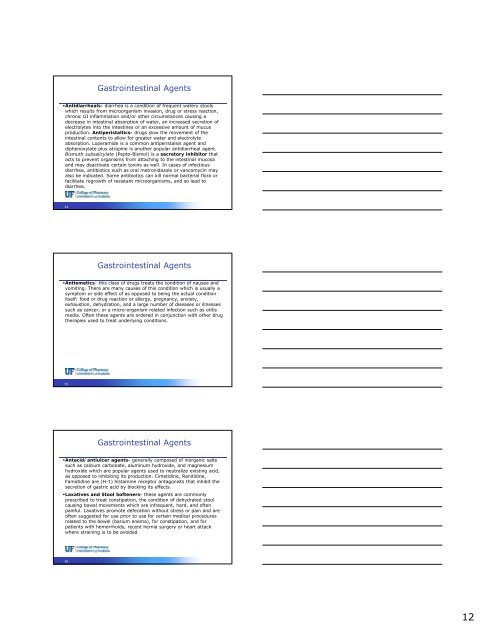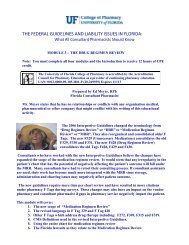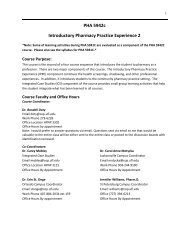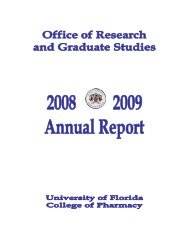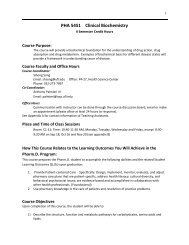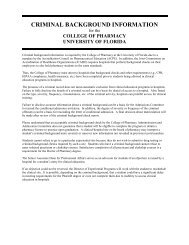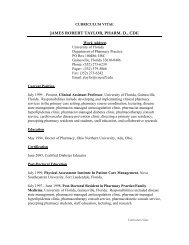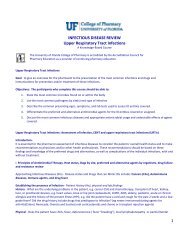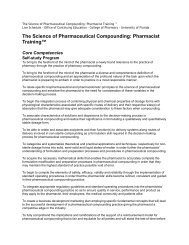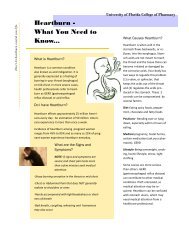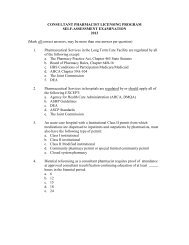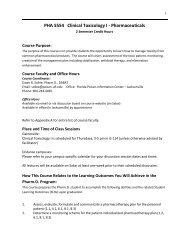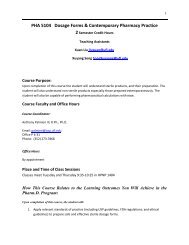Drug Classifications
Drug Classifications
Drug Classifications
You also want an ePaper? Increase the reach of your titles
YUMPU automatically turns print PDFs into web optimized ePapers that Google loves.
Gastrointestinal Agents<br />
Antidiarrheals- diarrhea is a condition of frequent watery stools<br />
which results from microorganism invasion, drug or stress reaction,<br />
chronic GI inflammation and/or other circumstances causing a<br />
decrease in intestinal absorption of water, an increased secretion of<br />
electrolytes into the intestines or an excessive amount of mucus<br />
production. Antiperistaltics- drugs slow the movement of the<br />
intestinal contents to allow for greater water and electrolyte<br />
absorption. Loperamide is a common antiperistalsis agent and<br />
diphenoxylate plus atropine is another popular antidiarrheal agent.<br />
Bismuth subsalicylate (Pepto-Bismol) is a secretory inhibitor that<br />
acts to prevent organisms from attaching to the intestinal mucosa<br />
and may deactivate certain toxins as well. In cases of infectious<br />
diarrhea, antibiotics such as oral metronidazole or vancomycin may<br />
also be indicated. Some antibiotics can kill normal bacterial flora or<br />
facilitate regrowth of resistant microorganisms, and so lead to<br />
diarrhea.<br />
34<br />
Gastrointestinal Agents<br />
Antiemetics- this class of drugs treats the condition of nausea and<br />
vomiting. There are many causes of this condition which is usually a<br />
symptom or side effect of as opposed to being the actual condition<br />
itself: food or drug reaction or allergy, pregnancy, anxiety,<br />
exhaustion, dehydration, and a large number of diseases or illnesses<br />
such as cancer, or a micro-organism related infection such as otitis<br />
media. Often these agents are ordered in conjunction with other drug<br />
therapies used to treat underlying conditions.<br />
35<br />
Gastrointestinal Agents<br />
Antacid/antiulcer agents- generally composed of inorganic salts<br />
such as calcium carbonate, aluminum hydroxide, and magnesium<br />
hydroxide which are popular agents used to neutralize existing acid,<br />
as opposed to inhibiting its production. Cimetidine, Ranitidine,<br />
Famotidine are (H-1) histamine receptor antagonists that inhibit the<br />
secretion of gastric acid by blocking its effects.<br />
Laxatives and Stool Softeners- these agents are commonly<br />
prescribed to treat constipation, the condition of dehydrated stool<br />
causing bowel movements which are infrequent, hard, and often<br />
painful. Laxatives promote defecation without stress or pain and are<br />
often suggested for use prior to use for certain medical procedures<br />
related to the bowel (barium enema), for constipation, and for<br />
patients with hemorrhoids, recent hernia surgery or heart attack<br />
where straining is to be avoided<br />
36<br />
12


